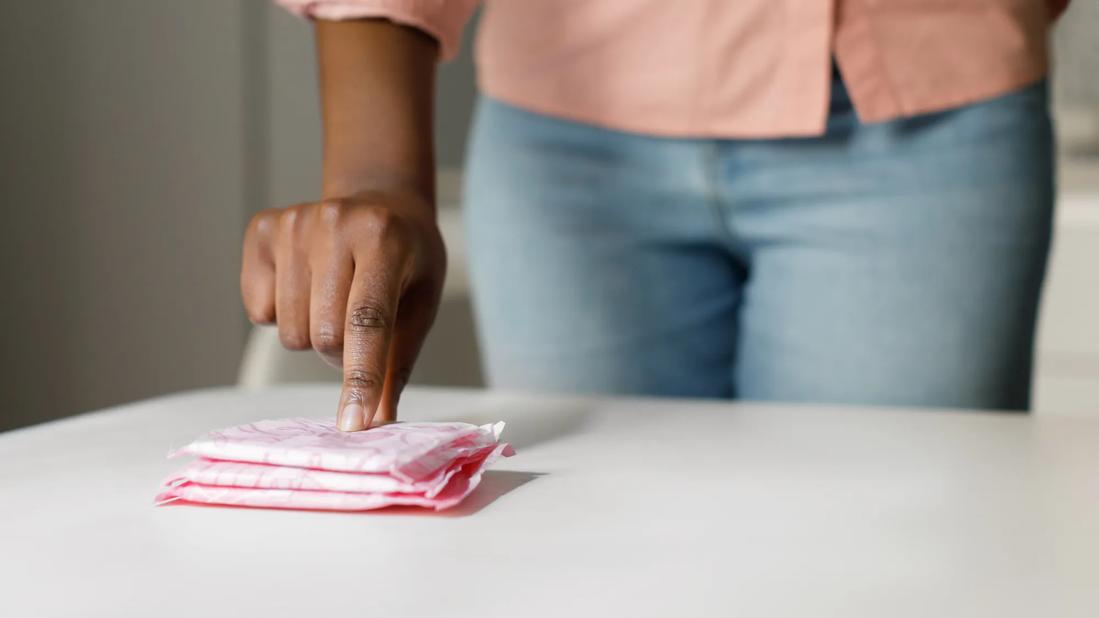Your period typically gets darker as the days go on, starting out pink and changing to red, dark red and even brown

Your period — it comes, it goes. It’s light, it’s heavy.
Advertisement
Cleveland Clinic is a non-profit academic medical center. Advertising on our site helps support our mission. We do not endorse non-Cleveland Clinic products or services. Policy
But have you noticed it sometimes changes color, like from pink to red to brown? What’s that all about?
Ob/Gyn Swapna Kollikonda, MD, explains what the color of your period blood is telling you.
It’s normal for your period blood to come in shades of pink, red and brown.
“The color of period blood depends on how long the blood stays in the uterus and vagina,” says Dr. Kollikonda. “The longer it sits, the darker it gets.”
Why? Over time, blood oxidizes — it reacts with oxygen in your body and gets darker. So, dark-colored period blood is older and has been in your uterus longer than the brighter stuff.
Dr. Kollikonda delves a little deeper into these period blood colors.

Image content: This image is available to view online.
View image online (https://assets.clevelandclinic.org/transform/45dff912-197e-4eb9-b03d-effc8b6eb894/period-blood-colors-infographic)
Pink period blood typically happens on the first day or so of your period.
That’s because your period first starts with fresh blood that’s bright and red. But as your body prepares to bleed, you often have more clear or milky vaginal discharge. The fresh blood and discharge mix together to make shades of pink.
Your blood may also take on a pinkish hue when your period is very light.
Following pink, bright red blood is what you’ll commonly see early in your period. This brilliant shade is a sign of fresh, healthy blood flow.
Advertisement
During your period, your uterus actively contracts — it tightens and releases. That process helps push blood out quickly (which also helps explain the cramps). So, bright red period blood is blood that hasn’t had time to oxidize. It moved through your uterus and out of your vagina quickly.
It’s also common to see bright red period blood if you spot between cycles.
Once the new blood is shed, older blood can take its place, changing your period blood to dark red several days after your period starts.
That darker color is a sign of blood that has pooled and remained in the uterus for a bit. Sure, your contracting uterus may have moved a good amount of blood out right away. But not all of it. And that more stubborn blood oxides and turns a darker shade before it makes its way out.
You may also notice dark red period blood that is thicker or has some small blood clots mixed in. That’s because blood that remains in your uterus can clump together and form clots. Small period clots are typically nothing to worry about. But if you notice changes to the size or number of clots you pass, it’s worth checking with a healthcare provider.
The last days of your period are typically when your period blood is darkest.
Brown period blood is common, as your uterus and vagina pass the last of the blood that’s been building up. By the last day of your period, the blood that you shed is highly oxidized, so it takes on a dark color. It may also mix with your vaginal discharge, making it appear dark brown.
There’s a reason that your women’s health provider probably never asks you about the color of your period blood: It doesn’t tell them very much about your gynecological or reproductive health.
“Ob/Gyns are rarely concerned about the different colors of period blood,” Dr. Kollikonda shares. “If you have spotting between your period or post-menopausal bleeding or a heavy flow or lighter flow, those are the kinds of things we’ll want to investigate.”
In other words, the color of your period is nowhere near as meaningful as other factors related to your cycle. So, rather than fretting about color, talk with a women’s health provider about concerns like:
Advertisement
Any of those symptoms could be reason to check for issues, like uterine polyps, fibroids or adenomyosis (when the uterine lining grows into the wall of the uterus).
“All these issues might impact how your uterus contracts and can cause clots or irregular bleeding or excessive bleeding.” Dr. Kollikonda explains.
Bottom line? When it comes to your period blood, color, consistency and amount are subjective — your experience is unique to you. But if you’re worried about what’s going on down there, it’s worth reaching out to a provider. Rest assured, though, that the color of your period blood probably isn’t a concern.
Advertisement

Sign up for our Health Essentials emails for expert guidance on nutrition, fitness, sleep, skin care and more.
Learn more about our editorial process.
Advertisement

Cravings are a natural response to hormonal changes, but giving into them may make you feel worse

These substitutes for tampons and pads can be a great option for lower cost, lower carbon footprint and longer wear times

Pads are a low-effort option for period management and come in different absorbencies, materials and shapes

Fluctuating hormones, water retention and a change in habits can cause temporary weight gain

Stress can cause light, late or nonexistent periods — which may eventually create a hormonal imbalance

Foods with iron, antioxidants and fiber can help you feel your best

If you wash regularly and change your underwear as needed, this can be a safe (and liberating) alternative to pads and tampons

Hormonal changes are the likely culprits behind the aches and fatigue before your period

Even small moments of time outdoors can help reduce stress, boost mood and restore a sense of calm

A correct prescription helps your eyes see clearly — but as natural changes occur, you may need stronger or different eyeglasses

Both are medical emergencies, but they are very distinct events with different causes